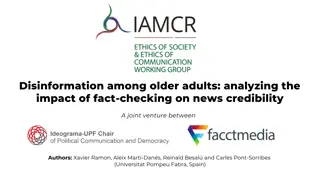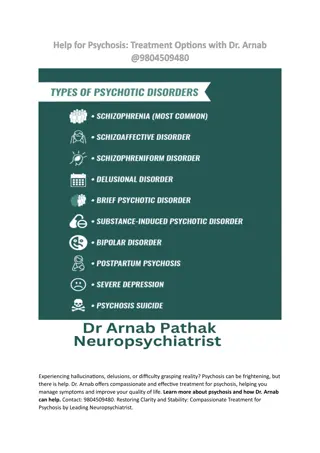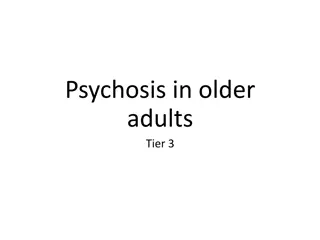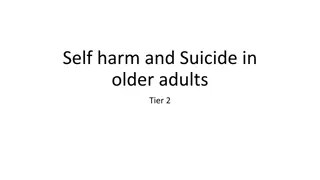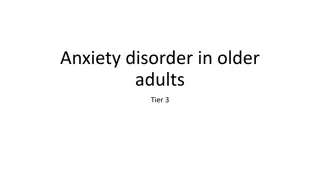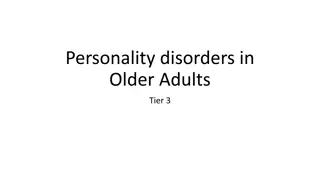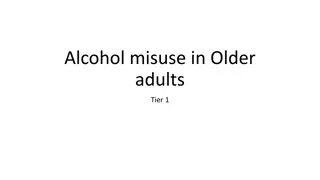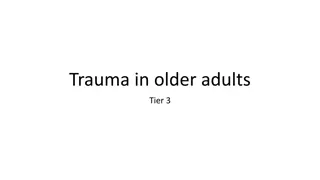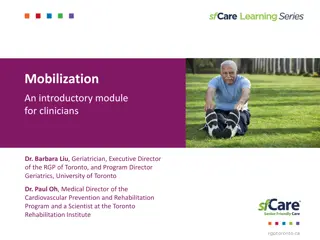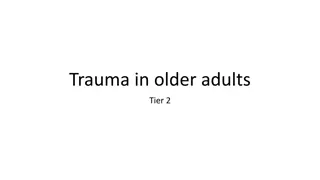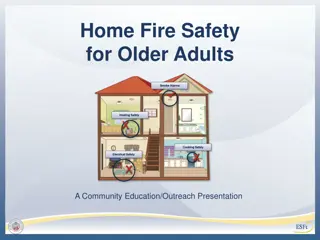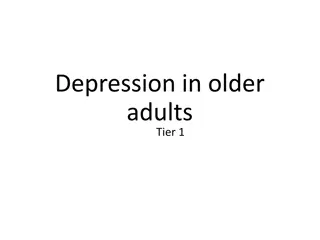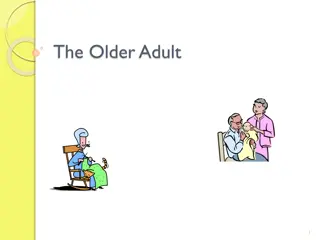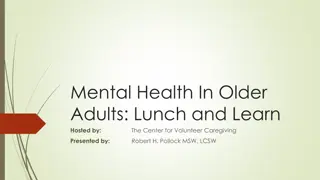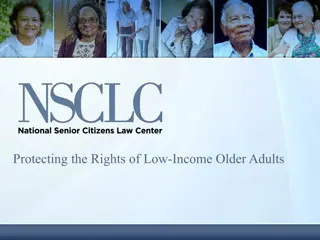Understanding Psychosis in Older Adults
Psychosis in older adults involves a loss of contact with reality, including hallucinations and delusions. Symptoms vary but can include disordered thoughts, behaviors, and negative symptoms. It is common in older adults and can have various causes, such as delirium, mood disorders, dementia, and substance misuse. Assessment involves ruling out delirium and considering past mental health history. Very Late Onset Schizophrenia-Like Psychosis (VLOSP) may present with specific symptoms. Awareness of these aspects is essential for diagnosis and appropriate management.
Download Presentation

Please find below an Image/Link to download the presentation.
The content on the website is provided AS IS for your information and personal use only. It may not be sold, licensed, or shared on other websites without obtaining consent from the author. Download presentation by click this link. If you encounter any issues during the download, it is possible that the publisher has removed the file from their server.
E N D
Presentation Transcript
Psychosis in older adults Tier 1
Psychosis What is psychosis? Some loss of contact with reality . This might involve hallucinations or delusions (NHS) Hallucinations hearing voices/ seeing things/ sensation that someone is touching them/ experiencing smells that are not there Delusions- unshakeable belief in something untrue When you perceive or interpret reality in a very different way from people around you. You might be said to 'lose touch' with reality. (MIND)
Symptoms of Psychosis Variable experiences depending upon the person and can include: Hallucinations Delusions Disordered or confused thoughts Disorganised behaviours Negative symptoms (reduction in motivation ,interest and or verbal expression) The person is usually unaware that experiences are not real
Psychosis in older adults Psychosis in older adults is important as it is Common Can have varied causes and presentations Different prognosis Associated morbidity and mortality is high Higher rate of adverse effects from treatment
Causes of Psychosis in older adults Delirium- Older adults with Delirium have high rates of psychosis (42%) Mood disorder (either depression or mania) Schizophrenia (either early onset or late onset) Dementia - Older adults with dementia have high rate of psychosis Alcohol and drug misuse/ withdrawals Some prescription medications
Assessment Is it new in onset or consistent with past mental health presentation? Rule out delirium Medical history including prescription medications Investigations: FBC, U&E, CRP, LFT, VIT B12 Urine dip, CXR, CT / MRI head Assess for dementia or deterioration in already diagnosed dementia Could this be a relapse of schizophrenia or depression with psychosis or a manic episode ?
Very late Onset Schizophrenia like Psychosis (VLOSP) Could present with : Persecutory delusions 3rdperson, running commentary and accusatory or abusive auditory hallucinations Visual, tactile and olfactory hallucinations This tends to occurs more in females than males Hearing impairment is a risk factor
Treatment of Psychosis If you suspect psychosis and physical cause has been excluded: Request assessment by Old Age Psychiatry services Consider use of low dose of antipsychotic medication Psychosocial interventions
Take home points Psychosis can occur in older adults and is common Take a detailed history Make sure you exclude a physical health cause for the symptoms Think about VLOSLP as a possible diagnosis Antipsychotics can work very well in these patients Low dose and slow titration is necessary, with early reviews Use of antipsychotics can however increase physical health risks
Resources MPC_04_04 Other People Tell Me I'm Seeing Things | Other People Tell Me I'm Seeing Things (mindedforfamilies.org.uk) This is an easy to access website for older adults and their families which has good advice about symptoms and treatment of hallucinations in older adults


